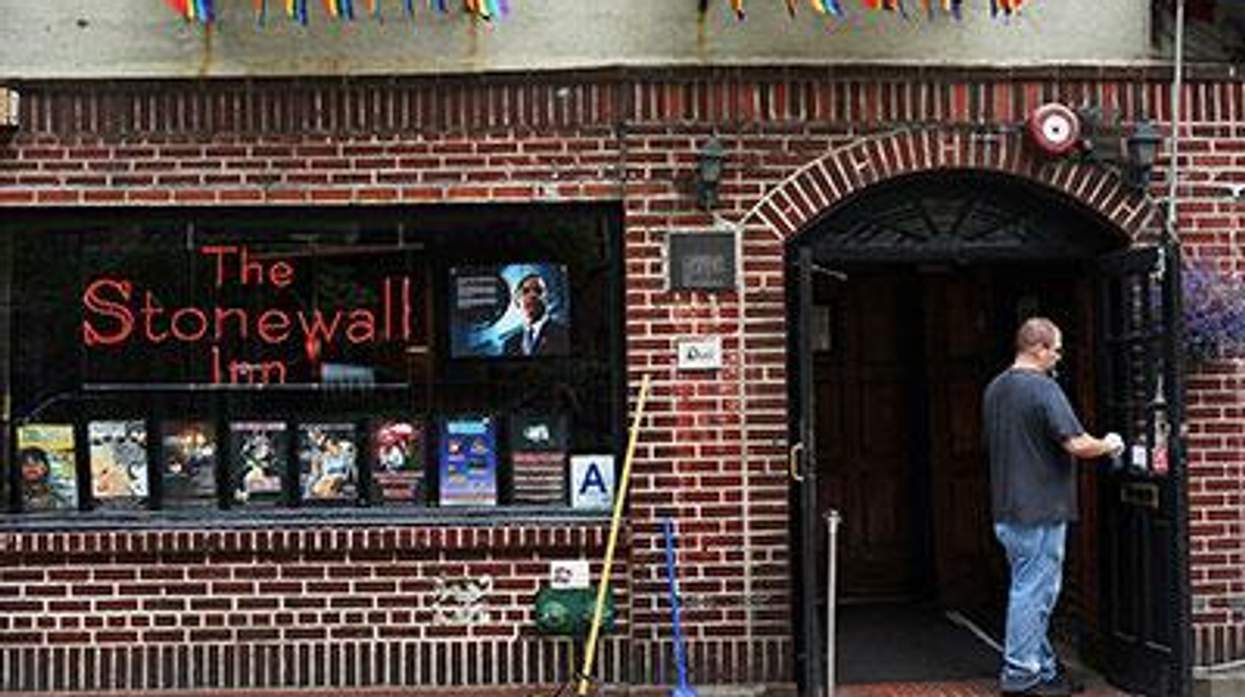Taking the elevator at the Manhattan Municipal Building to the Landmark Preservation Committee on the 9th floor, an elderly woman just slipped in as the doors were closing. She looked at me, and asked "Going to the hearing?" Pleasantly taken aback, I laughed and said yes, pleased in that moment to be obviously, visibly gay. On the ride up she expressed her hope that there would be a large crowd.
The hearing that we were both attending was for the presentation of research materials and testimonies for granting of landmark status to the Stonewall Inn, at 51-53 Christopher St. The crowd, though not huge, was larger than most audiences for LPC public hearings, and was notable for the palpable sense of camaraderie and excitement that pervaded the halls outside the hearing room.
While we waited for the two proposals on the docket preceding the proposal for the Stonewall Inn to be decided, people chatted with arriving friends while others handed out stickers in support of the measure, fliers for meetings about the preservation of other significant sites in the LGBT struggle for equality, and the form to fill out if interested in testifying.
The Stonewall Inn is already on the National Registry of Historic Places and is a New York state historic landmark, and was included in the Greenwich Village Historic District even before the June 28, 1969 uprising against the police by gays, lesbian, bisexual and transgender bar patrons. However, these provisions do not provide enough protection for the building against changes
its owners may want to make, and more importantly, this is the first building in New York City to be considered for landmark preservation specifically for its significance in the struggle for LGBT rights.
After a brief overview of the building's history from when construction began in 1863 through the first commemoration of the uprising in 1970, New York City Public Advocate Leticia James started the proceedings with a heartfelt testimony in which she described the confrontation between police and patrons at the Stonewall Inn as significant to all marginalized and oppressed peoples as "a symbol of rebellion and standing up for your rights."
For almost two hours, speaker after speaker gave short but impassioned speeches about the historic and cultural significance of the Stonewall Inn. City Council member Corey Johnson described coming to New York for the first time when he was 17, and heading to the Stonewall Inn within the first two hours, and closed his remarks by pointing out that "there are few locations that can be cited as the birthplace of an entire movement."
Speakers representing the state senate, City Comptroller Scott Stringer, the National Trust, the National Parks Conservation Association, the Greenwich Village Society for Historic Preservation, as well as private citizens -- including three men who had participated in the rebellion -- described the Stonewall uprising as "the embodiment of the American spirit," representing "the first time gay people stood up for themselves, and won" and as part of "a long continuum of the American experience." One participant in the original rebellion reminded the assembled of the police and mafia collusion that lead up to the events of that night, and said that while he was grateful for it, it really was "an awful place."
Among the over 20 people offering testimony, multiple people, including an LPC committee member, mentioned the unattractiveness and banality of the building's facade, and its lack of any true architectural relevance. However, this in itself was a milestone in New York City preservation -- the designation to protect this unremarkable-looking building was being sought
exclusively for what had happened there, not how it looked, and as Ken Lustbader, co-founder of the New York City LGBT Historic Sites Project pointed out, privacy-enhancing features like "the size and configuration of the doors and windows" are significant as "a vernacular architectural expression of LGBT history in New York City."
When the last speaker had had their say, Commissioner Meenakshi Srinivasan said, to much excitement, that "it is clear that the people have spoken," and that the committee would now do something to her knowledge unprecedented, and vote immediately, instead of reviewing the materials and scheduling the vote for a future session. The committee voted unanimously in favor of granting the Stonewall Inn landmark status, to the assembled crowd's loud and extended applause. After several committee members spoke movingly about the significance of this for all historical preservation, the crowd filed out and ebullient strangers congratulated each other for what had just taken place, and spurred on by victory, discussed all the other sites -- Julius's Bar, the LGBT Center on 13th Street, the firehouse at 99 Wooster St -- that hold significance for our community and that must be next on
the preservation agenda.
RICHARD WILLIAM ALLEN is a writer living in New York City. He is currently working on a memoir of gay life in Tel Aviv.




































































Charlie Kirk DID say stoning gay people was the 'perfect law' — and these other heinous quotes